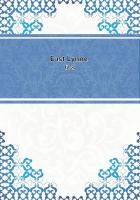In his sermons and exhortations Bernard dwelt equally on the wrath of God and the love of Christ. Said he to a runaway Cistercian, "Thou fearest watchings, fasts, and manual labor, but these are light to one who thinks on eternal fire. The remembrance of the outer darkness takes away all horror from solitude. Place before thine eyes the everlasting weeping and gnashing of teeth, the fury of those flames which can never be extinguished" (the essence of the theology of the Middle Ages,--the fear of Hell, of a physical and eternal Hell of bodily torments, by which fear those ages were controlled). Bernard, the loveliest impersonation of virtue which those ages saw, was not beyond their ideas. He impersonated them, and therefore led the age and became its greatest oracle. The passive virtues of the Sermon on the Mount were united with the fiercest passions of religious intolerance and the most repulsive views of divine vengeance. That is the soul of monasticism, even as reformed by Harding, Alberic, and Bernard in the twelfth century,--less human than in the tenth century, yet more intellectual.
The monks of Citeaux, of Morimond, of Pontigny, of Clairvaux, amid the wastes of a barren country, with their white habits and perpetual vigils and haircloth shirts and root dinners and hard labors in the field were yet the counsellors and ministers of kings and the creators of popes, and incited the nations to the most bloody and unfortunate wars in the whole history of society,--Imean the Crusades. Some were great intellectual giants, yet all repelled scepticism as life repels death; all dwelt on the sufferings of the cross as a door through which the penitent and believing could surely enter heaven, yet based the justice of the infinite Father of Love on what, when it appeals to consciousness, seems to be the direst injustice. We cannot despise the Middle Ages, which produced such beatific and exalted saints, but we pity those dismal times when the great mass of the people had so little pleasure and comfort in this life, and such gloomy fears of the world to come; when life was made a perpetual sacrifice and abnegation of all the pleasures that are given us to enjoy,--to use and not to pervert. Hence monasticism was repulsive, even in its best ages, to enlightened reason, and fatal to all progress among nations, although it served a useful purpose when men were governed by fear alone, and when violence and strife and physical discomfort and ignorance and degrading superstitions covered the fairest portion of the earth with a funereal pall for more than a thousand years.
The thirteenth century saw a new development of monastic institutions in the creation of the Mendicant Friars,--especially the Dominicans and Franciscans,--monks whose mission it was to wander over Europe as preachers, confessors, and teachers. The Benedictines were too numerous, wealthy, and corrupt to be reformed. They had become a scandal; they had lost the confidence of good men. There were needed more active partisans of the Pope to sustain his authority; the new universities required abler professors; the cities sought more popular preachers; the great desired more intelligent confessors. The Crusades had created a new field of enterprise, and had opened to the eye of Europe a wider horizon of knowledge. The universities which had grown up around the cathedral schools had kindled a spirit of inquiry.
Church architecture had become lighter, more cheerful, and more symbolic. The Greek philosophy had revealed a new method. The doctrines of the Church, if they did not require a new system, yet needed, or were supposed to need, the aid of philosophy, for the questions which the schoolmen discussed were so subtile and intricate that only the logic of Aristotle could make them clear.
Now the Mendicant orders entered with a zeal which has never been equalled, except by the Jesuits, into all the inquiries of the schools, and kindled a new religious life among the people, like the Methodists of the last century. They were somewhat similar to the Temperance reformers of the last fifty years. They were popular, zealous, intelligent, and religious. So great were their talents and virtues that they speedily spread over Europe, and occupied the principal pulpits and the most important chairs in the universities. Bonaventura, Albertus Magnus, Thomas Aquinas, and Duns Scotus were the great ornaments of these new orders. Their peculiarity--in contrast with the old orders--was, that they wandered from city to city and village to village at the command of their superiors. They had convents, like the other monks; but they professed absolute poverty, went barefooted, and submitted to increased rigors. Their vows were essentially those of the Benedictines. In less than a century, however, they too had degenerated, and were bitterly reproached for their vagabond habits and the violation of their vows. Their convents had also become rich, like those of the Benedictines. It was these friars whom Chaucer ridiculed, and against whose vices Wyclif declaimed. Yet they were retained by the popes for their services in behalf of ecclesiastical usurpation. It was they who were especially chosen to peddle indulgences. Their history is an impressive confirmation of the tendency of all human institutions to degenerate. It would seem that the mission of the Benedictines had been accomplished in the thirteenth century, and that of the Dominicans and Franciscans in the fourteenth.
But monasticism, in any of its forms, ceased to have a salutary influence on society when the darkness of the Middle Ages was dispersed. It is peculiarly a Mediaeval institution. As a Mediaeval institution, it conferred many benefits on the semi-barbarians of Europe. As a whole, considering the shadows of ignorance and superstition which veiled Christendom, and the evils which violence produced, its influence was beneficent.















